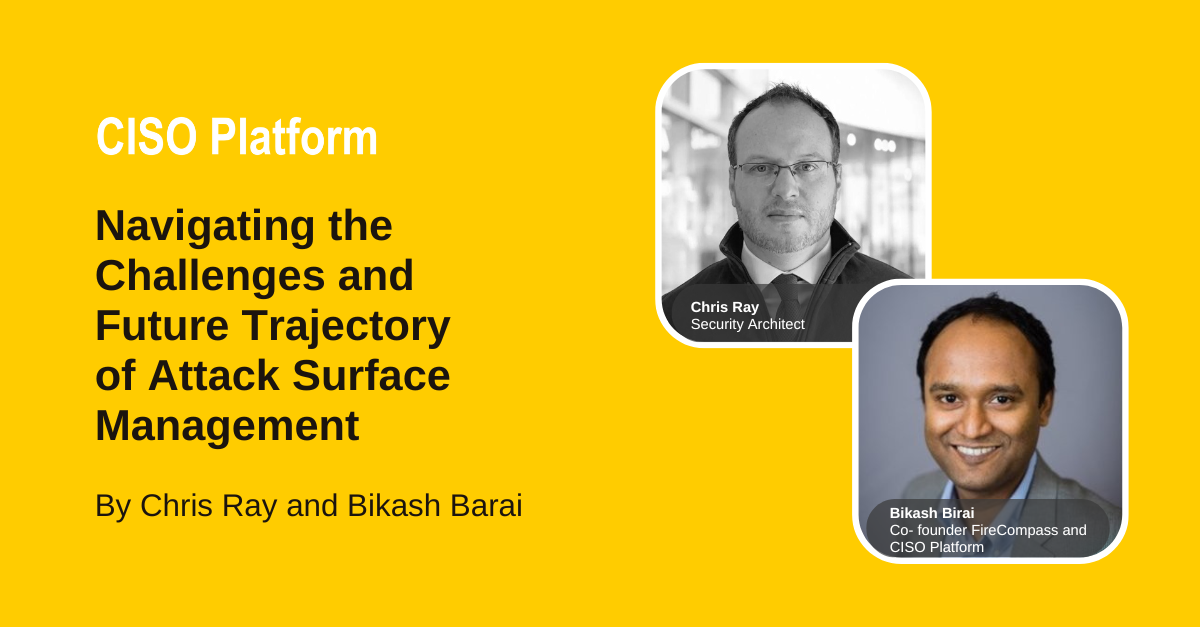In the dynamic realm of cybersecurity, Attack Surface Management (ASM) emerges as a critical tool for organizations seeking to bolster their defenses against evolving threats. While ASM holds immense promise in enhancing security posture and mitigating risks, it grapples with a host of challenges that shape its trajectory and evolution within the cybersecurity landscape. In this blog, we explore the challenges, drawbacks, and future prospects of ASM as it navigates through the complexities of the digital age.
Here is the verbatim discussion:
How regulation goes it is so slow uh I think this week or maybe it was last week the the White House the Biden White House Administration they just released a mandate on effectively uh I can't remember the exact verbage but you know talking about IPv6 security and how you have to now consider it and secure it how long has IPv6 been around that's how long it's taken to get regulation on it and it's not even law it may not even be passed they're just talking about it so unfortunately as much as I think ASM will benefit everybody um because think about all the major breaches in retail Insurance Finance government ASM probably could have reduced a lot of that you know uh Shrunk the blast radius considerably which helps everybody not just the vendors and not just the the people implementing ASM to protect their infrastructure but the consumers of those Services I I don't see it becoming a regulatory requirement in the next decade feces because it is kind of it has become a hot new technology but it's still kind of early days not not at the super mature stage right so what what are those uh kind of growing pains what what are the challenges which ASM as an industry is facing today what are the bad sides we talked about the good sides let's also talk about some of the bad sides and then we'll discuss a little bit about the future of ASM as an industry so let's start about what are the bad sides what what are the challenges for ASM um you thought of discussing but we just missed it as a part of the conversation anything comes to your mind before we conclude today and also we'll um uh we don't have much of time uh but we could have also opened.Yeah, so there's some questions which are also there.We can take out some of those questions. Yeah, let's do that.
Highlights:
Regulatory Lag and Slow Adoption: Despite its potential to enhance cybersecurity resilience, ASM faces a regulatory lag, with policymakers often trailing behind technological advancements. While recent mandates, such as the Biden Administration's focus on IPv6 security, highlight the growing recognition of ASM's importance, regulatory enforcement remains slow and uncertain. This delay impedes widespread adoption and implementation of ASM practices, leaving organizations vulnerable to emerging threats.
Complexity and Integration Challenges: ASM solutions encounter complexity and integration challenges, particularly in heterogeneous IT environments. The diverse array of networks, applications, and infrastructure components complicates ASM deployment and management, leading to interoperability issues and operational inefficiencies. Moreover, the need for seamless integration with existing security frameworks poses additional hurdles for organizations seeking to embrace ASM effectively.
False Positives and Alert Fatigue: A significant challenge plaguing ASM is the prevalence of false positives and alert fatigue. The inundation of alerts and notifications overwhelms security teams, leading to fatigue and desensitization to genuine threats. False positives diminish the efficacy of ASM solutions, undermining trust and confidence in their capabilities and impeding timely incident response and remediation efforts.
Maturity and Industry Acceptance: While ASM holds promise as a foundational pillar of modern cybersecurity operations, it remains in its nascent stages of maturity. Industry acceptance and adoption vary, with some organizations recognizing the value of ASM while others remain hesitant to embrace new technologies. Bridging this gap requires concerted efforts to educate stakeholders, demonstrate ROI, and foster a culture of proactive risk management and security awareness.
Speakers:
Chris Ray, a seasoned professional in the cybersecurity field, brings a wealth of experience from small teams to large financial institutions, as well as industries such as healthcare, financials, and tech. He has acquired an extensive amount of experience advising and consulting with security vendors, helping them find product-market fit as well as deliver cyber security services.
Bikash Barai is credited for several innovations in the domain of Network Security and Anti-Spam Technologies and has multiple patents in USPTO. Fortune recognized Bikash among India’s Top 40 Business Leaders under the age of 40 (Fortune 40-under-40).Bikash is also an active speaker and has spoken at various forums like TiE, RSA Conference USA, TEDx etc.
Earlier he founded iViZ an IDG Ventures-backed company that was later acquired by Cigital and now Synopsys. iViZ was the first company in the world to take Ethical Hacking (or Penetration Testing) to
the cloud.
https://twitter.com/bikashbarai1
https://www.linkedin.com/in/bikashbarai/


Comments